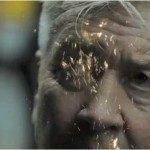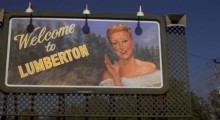David Lynch
-
DAVID LYNCH’S “CRAZY CLOWN TIME” VIDEO
We’re on deadline here at the magazine, but there’s always time for a David Lynch video, in this case a promo for the title track from his 2011 album, Crazy Clown Time. And be warned, although it adheres to YouTube’s family-friendly guidelines, it probably stills qualifies as NSFW…
by Nick Dawson on Apr 2, 2012 -
Cannes Director Thierry Fremaux on the Future of Film Festivals
To have the presence of Cannes Artistic Director Thierry Frémaux at your festival is like getting a seal of approval from the godfather of cinema himself. Arguably one of the most important players in the film industry today, Frémaux arrived by helicopter with French actress Isabelle Huppert to Emir Kusturica’s Fifth Annual Küstendorf Film and Music Festival, held this January in Serbia. “Sure Cannes is glamorous with its red carpet,” said Frémaux. “This is not the red carpet, it’s the white carpet, it’s the snow. And I think that is Emir’s style.” Küstendorf is a festival free of corporate sponsorship that aims to […]
by Ariston Anderson on Feb 9, 2012 -
Blue Velvet 25th Anniversary Blu-Ray Edition
Blue Velvet remains a masterpiece of American cinema – one of the defining films of the 1980s, and arguably still director David Lynch’s best work (personally, I actually slightly prefer Lost Highway, but I’ve become gradually fatigued over the years with people looking at me like I’m insane when I divulge that) – and it still retains every bit of its power today. But to have seen it upon its original 1986 release was like experiencing a bomb going off inside the theater. American films during the conservative Reagan decade were going through an awkward transitional period (and, outside […]
by Travis Crawford on Nov 15, 2011 -
BEHIND THE SCENES OF DAVID LYNCH’S DOM PERIGNON SHOOT

David Lynch’s vexing new album, Crazy Clown Town, releases worldwide today, but that’s not the only project the iconic director has been keeping busy with. Lynch recently traveled to the Abbey of Hautviller in northern France to shoot an ad for Champaign brand Dom Pérignon. Filmmaker Gavin Elder was along for the trip, and shot an accompanying behind the scenes portrait of Lynch for Nowness.com. The Power of Creation: David Lynch for Dom Pérignon is a suitably fractured look into Lynch’s creative process, beginning with the Blue Velvet director espousing on his passion for experimentation, then disintegrating into a collection […]
by Jane Schoenbrun on Nov 8, 2011 -
DAVID LYNCH’S CRAZY CLOWN TIME NOW STREAMING ON NPR
Almost as if they knew today was Halloween, NPR has offered up a free stream of Crazy Clown Time, the much anticipated debut album from director David Lynch. Eleanor Kagan writes: “To those familiar with (Lynch’s) tendencies, the content of Crazy Clown Time should come as no surprise. Written, performed and produced by Lynch with engineer Dean Hurley, Lynch’s first solo album finds him meandering through a series of dark dreams and visceral meditations on modern life and society.” Indeed, the album is a beguiling, often unsettling listen. In other words, it’s unmistakably Lynchian. Many of the songs call to […]
by Jane Schoenbrun on Oct 31, 2011 -
DAVID LYNCH RELEASES “CRAZY CLOWN TIME” TEASER
As I’ve written before, these days we are taking whatever David Lynch we can get. In this case, it’s an in-studio teaser for his forthcoming album of paranoid blues, Crazy Clown Time.
by Scott Macaulay on Oct 18, 2011 -
DAVID LYNCH’S “THE 3 Rs”
While we wait, perhaps quixotically, for a new David Lynch feature, here is The 3 Rs, a short film commissioned by and for the Film Festival Viennale. (If you’re a Lynch fan, make sure to check out our Blue Velvet project, a year-long consideration of his classic feature.)
by Scott Macaulay on Sep 24, 2011 -
The Blue Velvet Project, #6

Second # 282 An establishing shot of downtown Lumberton/Wilmington, showing the courthouse (from the back) in the mid foreground. In the previous shot, we have just seen Jeffrey for the first time as he walks through the field, wearing black. He stops, picks up a stone, and throws it as some junk. He then keeps walking, his back to the camera. At this point, we don’t know who he is or where he’s going. That shot is followed by this, at second #282, a static shot that lasts three seconds. When I began this project I wondered how frequently frames […]
by Nicholas Rombes on Aug 19, 2011 -
The Blue Velvet Project, #5

Second #235 What is this? Where are we? In a weird, dreamlike echo of the Amity Island billboard (defaced with the black shark fin) from Jaws, the Welcome to Lumberton billboard is a nest of contradictions. Instead of a shark fin, there should be a monster lurking in the background pine trees. The woman looks to be freeze-dried straight out of the Cold War, and brings to mind Shelley Winters as Charlotte Haze in Stanley Kubrick’s Lolita (1962). Could the awkward wave of her hand be any more artificial or uninviting? For a moment, we seem to have gone back […]
by Nicholas Rombes on Aug 17, 2011 -
The Blue Velvet Project, #4

Second #188 Jeffrey’s father has just suffered a stroke while watering his front yard, and has fallen to his back, writhing in pain, the hose that he still holds—in a sad and funny and helpless way—spraying water all around. That shot is followed by this one, as the camera pans slowly down, the background a blur, capturing the water in mid-air as Bobby Vinton sings “Blue Velvet,” which he had released in 1963, several months before the assassination of John F. Kennedy. The song, written by Bernie Wayne and Lee Morris, dates back to 1950. Wayne was a prolific composer, […]
by Nicholas Rombes on Aug 15, 2011




